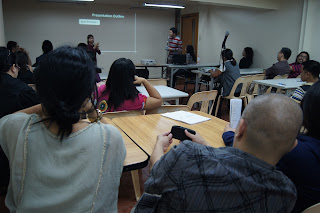German and Brazilian Sign Language
Ms. Anabelle Salazar and Mr. Raphael Domingo
Documenting Bilingual Strategies Used by Deaf Mothers and Teachers
Ms. Febe Sevilla
How Deaf Children Learn
Ms. Christina Sison
Sign Linguistics as a Philosophical Framework for Deaf Education
Mr. Leo Sulse
Thursday, 21 March 2013
Thursday, 14 March 2013
Learning Session on the 3rd International Conference on Sign Linguistics and Deaf Education
Experiences, Learnings, & Insights from the 3rd International Conference on Sign Linguistics and Deaf Education
May T. Cabutihan
CUHK Conference 2013: Reflections & Implications
Ma. Teresa Buenaventura
Quality of Bilingual Education Programs by Knoors, Daan and Wauters
Baby Ruth Evelina Reyes
May T. Cabutihan
CUHK Conference 2013: Reflections & Implications
Ma. Teresa Buenaventura
Quality of Bilingual Education Programs by Knoors, Daan and Wauters
Baby Ruth Evelina Reyes
Wednesday, 6 March 2013
Research Colloquium on Deaf Identity and Self-Efficacy
The Role of Social Support in promoting the Identity of Deaf Filipino Adolescents
by Christina S. Sison
This study determines the impact of peer and parent support, and support in the use of sign language on Deaf adolescents’ identity. Data were gathered from 107 Deaf Filipino adolescents by answering the Deaf Acculturation Scale (McCaw & Zea, 2010), Parent and Peer Support Scale (Willis, 1986), and Support in the use of Sign Language (adapted from Gregory, Bishop, & Sheldon, 1995). Using regression analysis, it was found that peer support promotes Deaf Identity.
Fostering Self-Efficacy inside the Classroom
by Leo Angelo G. Cabasag
Self-efficacy is commonly referred to as the people’s judgment of their capabilities to complete a task or to achieve a goal. How is self-efficacy related to students’ success in their academic life? What are the Deaf students’ experiences on Self-efficacy? What strategies can teachers use to build and develop self-efficacy among their students?
The session will focus on self-efficacy and how this concept plays a major role inside the classroom. The session will also provide opportunities for educators to deepen their understanding on various ways to foster self-efficacy.
by Christina S. Sison
This study determines the impact of peer and parent support, and support in the use of sign language on Deaf adolescents’ identity. Data were gathered from 107 Deaf Filipino adolescents by answering the Deaf Acculturation Scale (McCaw & Zea, 2010), Parent and Peer Support Scale (Willis, 1986), and Support in the use of Sign Language (adapted from Gregory, Bishop, & Sheldon, 1995). Using regression analysis, it was found that peer support promotes Deaf Identity.
Fostering Self-Efficacy inside the Classroom
by Leo Angelo G. Cabasag
Self-efficacy is commonly referred to as the people’s judgment of their capabilities to complete a task or to achieve a goal. How is self-efficacy related to students’ success in their academic life? What are the Deaf students’ experiences on Self-efficacy? What strategies can teachers use to build and develop self-efficacy among their students?
The session will focus on self-efficacy and how this concept plays a major role inside the classroom. The session will also provide opportunities for educators to deepen their understanding on various ways to foster self-efficacy.
Subscribe to:
Comments (Atom)



















































